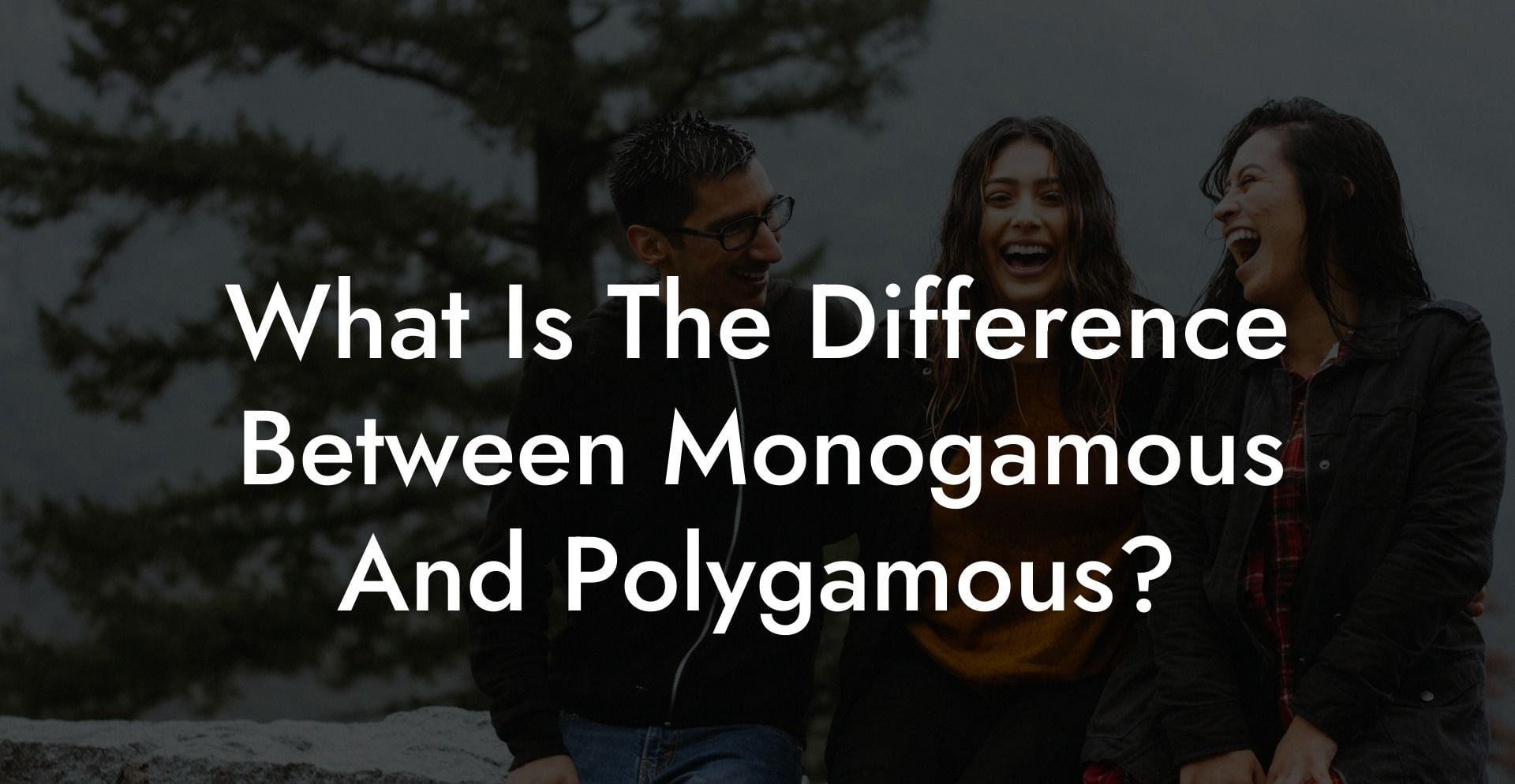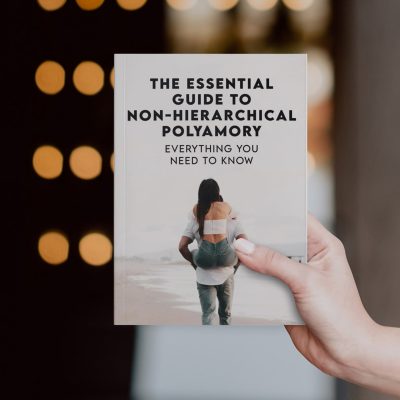Guide to What Is The Difference Between Monogamous And Polygamous?

In this guide, we will define and compare monogamy and polygamy, delve into their historical roots, discuss their cultural, ethical, and legal implications, and examine the psychological aspects and practical considerations of each. Whether you are a student, researcher, or simply curious about monogamy & alternative relationship models, this resource provides clear explanations and practical insights to help you understand how these two relationship structures differ.
Quick Links to Useful Sections
- Defining Monogamy and Polygamy
- What Is Monogamy?
- What Is Polygamy?
- Cultural and Historical Context
- Historical Roots of Monogamy
- Historical Roots of Polygamy
- Cultural Perceptions Today
- Ethical and Legal Considerations
- Ethical Implications
- Legal Status
- Psychological and Emotional Dimensions
- Impact on Relationship Dynamics
- Emotional Intelligence and Self-Awareness
- Social and Community Impact
- Benefits and Challenges of Monogamous and Polygamous Relationships
- Benefits of Monogamy
- Challenges of Monogamy
- Benefits of Polygamy
- Challenges of Polygamy
- FAQ: Your What Is the Difference Between Monogamous and Polygamous Questions Answered
As societal norms continue to evolve, understanding the distinctions between monogamy and polygamy is essential for engaging in informed discussions about love, commitment, and family structures. By the end of this guide, you will have a deeper appreciation of the unique characteristics, benefits, and challenges associated with each model.
Defining Monogamy and Polygamy
What Is Monogamy?
Monogamy is the practice of forming an exclusive romantic and/or sexual relationship with one partner at a time. In a monogamous relationship, both partners commit to each other exclusively, often with the understanding that intimacy, emotional connection, and legal marriage (in many cultures) are shared solely between the two of them. Monogamy is widely considered the traditional model of relationships in many parts of the world, and it is typically characterized by long-term commitment, exclusivity, and a shared vision of partnership.
Key elements of monogamy include:
- Exclusivity: A mutual agreement to engage in intimate, romantic, or sexual activities only with each other.
- Long-Term Commitment: A focus on building a life together, which often involves shared finances, cohabitation, and possibly marriage.
- Cultural and Legal Norms: Monogamy is the predominant legal and cultural model in many societies, influencing everything from social expectations to family law.
What Is Polygamy?
Polygamy is the practice of having more than one spouse simultaneously. This model is most commonly observed in two forms:
- Polygyny: A form of polygamy in which one man is married to multiple women.
- Polyandry: A less common form in which one woman is married to multiple men.
Polygamy is deeply rooted in various cultural, religious, and historical contexts. In many societies, plural marriage has been practiced as a means of strengthening family ties, enhancing social status, and managing economic resources. While polygamy is illegal or not recognized in many Western legal systems, it remains an accepted practice in certain cultural and religious communities.
Cultural and Historical Context
Historical Roots of Monogamy
Monogamy has been the dominant relationship model in many Western societies for centuries. Influenced by religious teachings, social norms, and legal frameworks, monogamous relationships became the standard for building families, inheriting property, and maintaining social order. The emphasis on an exclusive bond between two people is a hallmark of many traditional cultures, and it is often linked to concepts of fidelity, trust, and long-term stability.
Historical Roots of Polygamy
Polygamy has a long and varied history in many parts of the world. In ancient societies across Africa, Asia, and the Middle East, plural marriages were common and often served practical purposes, such as strengthening family alliances, increasing workforce for agrarian activities, and consolidating wealth. Religious texts and cultural traditions sometimes provided the framework for these practices. Despite the modern legal prohibitions in many regions, the historical legacy of polygamy continues to influence contemporary debates on family structure and relationship diversity.
Cultural Perceptions Today
Today, monogamy is widely seen as the conventional standard in many societies, supported by legal institutions and cultural narratives. Polygamy, however, is often viewed through a more complex lens. While it is stigmatized in many parts of the world, some communities continue to practice it as a part of their cultural or religious heritage. Additionally, the rise of alternative relationship models like polyamory has sparked renewed interest in plural relationships, prompting a reexamination of what constitutes ethical and fulfilling partnerships.

Love is infinite, but your calendar is brutally finite. The fantasy is deep connection; the reality is often just exhausted "calendar tetris." Promising time you don't actually have isn't romantic, it’s a recipe for burnout and broken trust. That sinking feeling when you have to cancel again? That’s the sound of overextension destroying your relationships.
This calculator forces you to confront the math of your life. Do you actually have space for another heart, or are you just setting everyone up for disappointment?

The fantasy is total autonomy and connection. The reality? It can feel like drowning in scheduling chaos and misunderstood expectations. That anxiety you feel isn’t just stress; it’s the wobble of living without a default "anchor." Without a solid architecture, Solo Polyamory stops being a life design and starts being a recipe for burnout and confusion.
The Essential Guide replaces the drift with a concrete anchor. We provide the "Solo Ethic," boundary scripts, and burnout protocols needed to protect your peace. Don't just date around—build a life that actually works for you.

Hierarchy sounds like a corporate org chart until someone gets their feelings hurt. That stomach-turning fear that you are just a "secondary" who can be fired at any time is real. If your relationship feels like a secret ranking system, you are doing it wrong.
Ambiguity is where resentment grows. The Essential Guide replaces the "who matters more" panic with a concrete charter. We provide the scripts and equity guardrails needed to protect every heart in the polycule. Stop guessing and start building.

The ideal is pure equality. The reality? It often slides into hidden rankings where someone gets hurt. That sinking feeling that you are secretly a "secondary" despite the label? That is your intuition detecting couple privilege. Ambiguity is where resentment thrives.
The Essential Guide replaces vague promises with concrete governance. We provide the charters, equity tools, and jealousy protocols needed to ensure "non-hierarchical" isn't just a fantasy. Stop guessing who matters most. Build a network that is actually fair.

The fantasy is total autonomy and connection. The reality? It can feel like drowning in scheduling chaos and misunderstood expectations. That anxiety you feel isn’t just stress; it’s the wobble of living without a default "anchor." Without a solid architecture, Solo Polyamory stops being a life design and starts being a recipe for burnout and confusion.
The Essential Guide replaces the drift with a concrete anchor. We provide the "Solo Ethic," boundary scripts, and burnout protocols needed to protect your peace. Don't just date around—build a life that actually works for you.

Hierarchy sounds like a corporate org chart until someone gets their feelings hurt. That stomach-turning fear that you are just a "secondary" who can be fired at any time is real. If your relationship feels like a secret ranking system, you are doing it wrong.
Ambiguity is where resentment grows. The Essential Guide replaces the "who matters more" panic with a concrete charter. We provide the scripts and equity guardrails needed to protect every heart in the polycule. Stop guessing and start building.
Ethical and Legal Considerations
Ethical Implications
In monogamous relationships, ethical considerations typically revolve around fidelity, honesty, and mutual respect. When it comes to polygamous relationships, ethical considerations become more complex. Ethical polygamy emphasizes the importance of informed consent, equality, and transparency among all partners. Each individual must willingly agree to the relationship dynamics, and power imbalances should be actively addressed.
The ethical debate often centers on whether plural relationships can be structured in a way that respects each partner’s autonomy and emotional well-being, challenging historical practices that may have been exploitative.
Legal Status
Legally, monogamous marriages are recognized in nearly all countries, with a well-established framework governing rights, responsibilities, and protections for spouses and families. In contrast, polygamous marriages are illegal in most Western legal systems. Where polygamy is practiced, it is often under customary or religious law rather than through state-sanctioned marriage.
The legal implications of polygamy include issues such as inheritance rights, spousal benefits, and custody arrangements, which are typically designed around monogamous relationships. This legal disparity creates challenges for individuals in plural marriages, prompting ongoing debates about family law reform.
Psychological and Emotional Dimensions
Impact on Relationship Dynamics
In monogamous relationships, emotional and sexual intimacy is concentrated between two partners, which can lead to a deep, focused connection. In contrast, polygamous relationships involve balancing multiple relationships simultaneously, which can be both enriching and challenging. The ability to navigate different emotional needs, manage jealousy, and maintain effective communication is crucial in both types of relationships.
Emotional Intelligence and Self-Awareness
Successful management of either monogamous or polygamous relationships requires high levels of emotional intelligence. For monogamous couples, this means nurturing a strong, exclusive bond. For those in polygamous relationships, it involves understanding and addressing the emotional needs of multiple partners, as well as managing complex feelings like jealousy or insecurity.
Social and Community Impact
The societal acceptance of monogamy is reinforced by legal institutions and cultural norms, which can provide a sense of stability and social support. Polygamous families, on the other hand, may face external judgment and stigma, making it important for individuals in plural relationships to build supportive communities and seek out networks of like-minded individuals.
Benefits and Challenges of Monogamous and Polygamous Relationships
Benefits of Monogamy
- Simplicity and Clarity: With only two people involved, roles, responsibilities, and expectations tend to be more straightforward.
- Legal Recognition: Monogamous marriages are legally recognized and supported by established frameworks.
- Focused Emotional Bond: Exclusivity often fosters a deep, concentrated emotional and sexual connection.
Challenges of Monogamy
- Limited Emotional Diversity: Some individuals may feel that an exclusive relationship does not fully meet all their emotional needs.
- Potential for Complacency: Over time, couples may experience stagnation or a decline in sexual and emotional intimacy.
Benefits of Polygamy
- Diverse Support System: Multiple partners can provide varied forms of emotional, practical, and financial support.
- Increased Flexibility: The structure can allow for a more dynamic distribution of roles and responsibilities, which can adapt to changing needs.
- Cultural and Religious Fulfillment: In some communities, polygamy is an important cultural or religious tradition that reinforces group identity and support.
Challenges of Polygamy
- Legal and Financial Complexities: Lack of legal recognition in many regions can lead to issues with inheritance, custody, and spousal rights.
- Emotional Complexity: Balancing multiple relationships requires advanced communication skills and high emotional intelligence to manage feelings like jealousy and insecurity.
- Social Stigma: Polygamous families may face prejudice and societal misunderstanding, leading to isolation or discrimination.
FAQ: Your What Is the Difference Between Monogamous and Polygamous Questions Answered
1. What is monogamy?
Monogamy is the practice of having an exclusive romantic and/or sexual relationship with one partner at a time, typically characterized by long-term commitment and legal marriage.
2. What is polygamy?
Polygamy is the practice of having more than one spouse simultaneously, most commonly observed as polygyny (one man with multiple wives) or, less frequently, polyandry (one woman with multiple husbands).
3. How do monogamous and polygamous relationships differ legally?
Monogamous marriages are legally recognized in nearly all countries, with established frameworks for rights and responsibilities. In contrast, polygamous marriages are generally illegal in Western legal systems and may only be recognized under certain religious or customary laws in other regions.
4. What are the main emotional differences between the two models?
Monogamous relationships typically focus on a deep, exclusive emotional bond between two people. Polygamous relationships require balancing multiple emotional connections, which can provide diverse support but also pose challenges like managing jealousy and ensuring equitable attention.
5. What are some benefits of monogamy?
Benefits of monogamy include simplicity in relationship dynamics, clear roles and responsibilities, legal recognition, and a focused, exclusive emotional connection.
6. What are some benefits of polygamy?
Polygamy can offer a diverse support system, increased flexibility in distributing responsibilities, and fulfillment of cultural or religious traditions, although it may also involve complex legal and emotional challenges.
7. Where can I find additional resources on these topics?
Additional resources include academic journals, books such as "The Ethical Slut" and "More Than Two," podcasts like "Multiamory" and "Polyamory Weekly," and online communities such as r/polyamory.
Resources and Community Support: Your Next Steps
- "The Ethical Slut" by Dossie Easton & Janet Hardy – A groundbreaking book exploring various models of relationships and ethical non-monogamy.
- "More Than Two" by Franklin Veaux & Eve Rickert – A comprehensive guide offering practical advice on managing relationship dynamics, including comparisons of monogamous and polygamous models.
- Podcasts: Listen to "Multiamory" and "Polyamory Weekly" for engaging discussions and personal stories on alternative relationship structures.
- Online Communities: Join platforms such as r/polyamory to exchange insights and connect with others interested in diverse relationship models.
- Workshops and Webinars: Attend events focused on relationship psychology and ethical non-monogamy to expand your knowledge and network.
By exploring these resources and applying the strategies outlined in this guide, you can develop a clear, informed understanding of the differences between monogamous and polygamous relationships. Embrace continuous learning, open dialogue, and self-reflection as you navigate the diverse landscape of love and commitment.

Love is infinite, but your calendar is brutally finite. The fantasy is deep connection; the reality is often just exhausted "calendar tetris." Promising time you don't actually have isn't romantic, it’s a recipe for burnout and broken trust. That sinking feeling when you have to cancel again? That’s the sound of overextension destroying your relationships.
This calculator forces you to confront the math of your life. Do you actually have space for another heart, or are you just setting everyone up for disappointment?

The fantasy is total autonomy and connection. The reality? It can feel like drowning in scheduling chaos and misunderstood expectations. That anxiety you feel isn’t just stress; it’s the wobble of living without a default "anchor." Without a solid architecture, Solo Polyamory stops being a life design and starts being a recipe for burnout and confusion.
The Essential Guide replaces the drift with a concrete anchor. We provide the "Solo Ethic," boundary scripts, and burnout protocols needed to protect your peace. Don't just date around—build a life that actually works for you.

Hierarchy sounds like a corporate org chart until someone gets their feelings hurt. That stomach-turning fear that you are just a "secondary" who can be fired at any time is real. If your relationship feels like a secret ranking system, you are doing it wrong.
Ambiguity is where resentment grows. The Essential Guide replaces the "who matters more" panic with a concrete charter. We provide the scripts and equity guardrails needed to protect every heart in the polycule. Stop guessing and start building.

The ideal is pure equality. The reality? It often slides into hidden rankings where someone gets hurt. That sinking feeling that you are secretly a "secondary" despite the label? That is your intuition detecting couple privilege. Ambiguity is where resentment thrives.
The Essential Guide replaces vague promises with concrete governance. We provide the charters, equity tools, and jealousy protocols needed to ensure "non-hierarchical" isn't just a fantasy. Stop guessing who matters most. Build a network that is actually fair.

The fantasy is total autonomy and connection. The reality? It can feel like drowning in scheduling chaos and misunderstood expectations. That anxiety you feel isn’t just stress; it’s the wobble of living without a default "anchor." Without a solid architecture, Solo Polyamory stops being a life design and starts being a recipe for burnout and confusion.
The Essential Guide replaces the drift with a concrete anchor. We provide the "Solo Ethic," boundary scripts, and burnout protocols needed to protect your peace. Don't just date around—build a life that actually works for you.

Hierarchy sounds like a corporate org chart until someone gets their feelings hurt. That stomach-turning fear that you are just a "secondary" who can be fired at any time is real. If your relationship feels like a secret ranking system, you are doing it wrong.
Ambiguity is where resentment grows. The Essential Guide replaces the "who matters more" panic with a concrete charter. We provide the scripts and equity guardrails needed to protect every heart in the polycule. Stop guessing and start building.
Accountability When Harm Occurs
Aging And Long Term Planning
Alternatives To Veto Policies
Attachment Styles And Hierarchy
Avoiding Disposable Partner Dynamics
Avoiding Entitlement In Primary Relationships
Avoiding Objectification And Ranking Language
Blended Families And Co Parenting Dynamics
Boundaries Versus Rules In Hierarchical Contexts
Caregiving And Illness Decisions
Choosing Hierarchy Intentionally
Common Challenges Faced By Secondary Partners
Common Mistakes Primary Partners Make
Common Mistakes Secondary Partners Make
Common Myths About Hierarchical Polyamory
Communicating Limits Without Devaluing Others
Community Perception Of Hierarchical Polyamory
Compersion When Time And Resources Are Unequal
Consent And Transparency In Hierarchy
Consent Under Unequal Power Dynamics
Cultural And Socioeconomic Influences On Hierarchy
De Escalation Without Punishment
Deciding Whether Hierarchical Polyamory Is Right For You
Decision Making Power In Primary Relationships
Descriptive Versus Prescriptive Hierarchy
Emotional Labor Distribution Across Partners
Emotional Regulation Skills For Hierarchical Dynamics
Emotional Safety For Non Primary Partners
Ending Relationships Ethically Within Hierarchy
Ethical Foundations Of Hierarchical Structures
Ethical Storytelling About Hierarchical Relationships
Ethical Use Of Veto Power
Fear Of Replacement Or Demotion
Financial Transparency With Multiple Partners
Handling Breakups Within A Hierarchical System
Hierarchy Versus Relationship Anarchy
Holidays Vacations And Special Occasions
How Hierarchical Polyamory Differs From Non Hierarchical Polyamory
How Hierarchical Polyamory Evolves Over Time
How Privilege Shows Up In Daily Decisions
How To Disclose Hierarchy Early In Dating
Inclusion Versus Exclusion Practices
Integrating Hierarchy With Personal Values
Integrating New Partners Ethically
Intersectionality And Power In Hierarchy
Jealousy In Hierarchical Polyamory
Legal Risks And Protections
Lessons Hierarchical Polyamory Teaches About Love
Letting Go Of Hierarchy When It No Longer Fits
Living Together Versus Living Apart
Long Distance Relationships Within Hierarchy
Managing Boundary Violations
Managing Comparison Between Partners
Marriage And Legal Privilege In Hierarchical Polyamory
Measuring Fulfillment Beyond Priority Status
Navigating Attachment As A Secondary Partner
Navigating Conflicts Between Partners At Different Levels
Navigating Judgment From Non Hierarchical Communities
Ongoing Check Ins Across Relationship Levels
Opening Or Closing The Hierarchy
Parenting And Family Planning Within Hierarchy
Power Imbalances Inherent In Hierarchy
Pregnancy And Parenting Transitions
Primary Secondary And Tertiary Relationship Definitions
Privacy And Information Flow
Re Negotiating Hierarchy After Major Life Events
Rebuilding Trust After Structural Changes
Renegotiating Primary Agreements Over Time
Repair Conversations After Hierarchical Tension
Repairing Harm Caused By Hierarchical Decisions
Resentment And Unspoken Grief
Responsibilities And Expectations Of Primary Partners
Rules That Protect Versus Rules That Control
Scheduling Fairness Versus Equality
Self Worth Outside Relationship Rank
Setting Clear Expectations With New Partners
Shared Finances And Resource Prioritization
Signs Hierarchy Is Functioning Well
Supporting Mental Health Across The Network
Supporting Secondary Partners Through Transitions
The Origins And History Of Hierarchical Polyamory
The Role Of Nesting Partners
Therapy And Coaching For Hierarchical Polyamory
Time Allocation And Scheduling Priorities
Transparency Without Oversharing
Treating All Partners As Whole People
Understanding Couple Privilege
Warning Signs Of Unhealthy Hierarchy
What Hierarchical Polyamory Is And What It Is Not
What It Means To Be A Primary Partner
What It Means To Be A Secondary Partner
What People Wish They Knew Earlier
What Success Looks Like In Hierarchical Polyamory
When Hierarchy Activates Past Trauma
When Hierarchy Becomes Coercive
When Hierarchy Emerges Without Intention
When Primary Relationships Change
When Professional Support Is Needed
When Secondary Relationships Deepen
Why Hierarchy Exists In Some Polyamorous Relationships
Accountability When Harm Occurs
Aging And Long Term Planning
Alternatives To Veto Policies
Attachment Styles And Hierarchy
Avoiding Disposable Partner Dynamics
Avoiding Entitlement In Primary Relationships
Avoiding Objectification And Ranking Language
Blended Families And Co Parenting Dynamics
Boundaries Versus Rules In Hierarchical Contexts
Caregiving And Illness Decisions
Choosing Hierarchy Intentionally
Common Challenges Faced By Secondary Partners
Common Mistakes Primary Partners Make
Common Mistakes Secondary Partners Make
Common Myths About Hierarchical Polyamory
Communicating Limits Without Devaluing Others
Community Perception Of Hierarchical Polyamory
Compersion When Time And Resources Are Unequal
Consent And Transparency In Hierarchy
Consent Under Unequal Power Dynamics
Cultural And Socioeconomic Influences On Hierarchy
De Escalation Without Punishment
Deciding Whether Hierarchical Polyamory Is Right For You
Decision Making Power In Primary Relationships
Descriptive Versus Prescriptive Hierarchy
Emotional Labor Distribution Across Partners
Emotional Regulation Skills For Hierarchical Dynamics
Emotional Safety For Non Primary Partners
Ending Relationships Ethically Within Hierarchy
Ethical Foundations Of Hierarchical Structures
Ethical Storytelling About Hierarchical Relationships
Ethical Use Of Veto Power
Fear Of Replacement Or Demotion
Financial Transparency With Multiple Partners
Handling Breakups Within A Hierarchical System
Hierarchy Versus Relationship Anarchy
Holidays Vacations And Special Occasions
How Hierarchical Polyamory Differs From Non Hierarchical Polyamory
How Hierarchical Polyamory Evolves Over Time
How Privilege Shows Up In Daily Decisions
How To Disclose Hierarchy Early In Dating
Inclusion Versus Exclusion Practices
Integrating Hierarchy With Personal Values
Integrating New Partners Ethically
Intersectionality And Power In Hierarchy
Jealousy In Hierarchical Polyamory
Legal Risks And Protections
Lessons Hierarchical Polyamory Teaches About Love
Letting Go Of Hierarchy When It No Longer Fits
Living Together Versus Living Apart
Long Distance Relationships Within Hierarchy
Managing Boundary Violations
Managing Comparison Between Partners
Marriage And Legal Privilege In Hierarchical Polyamory
Measuring Fulfillment Beyond Priority Status
Navigating Attachment As A Secondary Partner
Navigating Conflicts Between Partners At Different Levels
Navigating Judgment From Non Hierarchical Communities
Ongoing Check Ins Across Relationship Levels
Opening Or Closing The Hierarchy
Parenting And Family Planning Within Hierarchy
Power Imbalances Inherent In Hierarchy
Pregnancy And Parenting Transitions
Primary Secondary And Tertiary Relationship Definitions
Privacy And Information Flow
Re Negotiating Hierarchy After Major Life Events
Rebuilding Trust After Structural Changes
Renegotiating Primary Agreements Over Time
Repair Conversations After Hierarchical Tension
Repairing Harm Caused By Hierarchical Decisions
Resentment And Unspoken Grief
Responsibilities And Expectations Of Primary Partners
Rules That Protect Versus Rules That Control
Scheduling Fairness Versus Equality
Self Worth Outside Relationship Rank
Setting Clear Expectations With New Partners
Shared Finances And Resource Prioritization
Signs Hierarchy Is Functioning Well
Supporting Mental Health Across The Network
Supporting Secondary Partners Through Transitions
The Origins And History Of Hierarchical Polyamory
The Role Of Nesting Partners
Therapy And Coaching For Hierarchical Polyamory
Time Allocation And Scheduling Priorities
Transparency Without Oversharing
Treating All Partners As Whole People
Understanding Couple Privilege
Warning Signs Of Unhealthy Hierarchy
What Hierarchical Polyamory Is And What It Is Not
What It Means To Be A Primary Partner
What It Means To Be A Secondary Partner
What People Wish They Knew Earlier
What Success Looks Like In Hierarchical Polyamory
When Hierarchy Activates Past Trauma
When Hierarchy Becomes Coercive
When Hierarchy Emerges Without Intention
When Primary Relationships Change
When Professional Support Is Needed
When Secondary Relationships Deepen
Why Hierarchy Exists In Some Polyamorous Relationships
Accountability When Harm Happens
Attachment Styles In Non Monogamous Relationships
Avoiding Coercion And Pressure
Avoiding Emotional And Relational Exhaustion
Balancing Work Family And Relationships
Barrier Use And Risk Profiles
Boundaries Versus Rules In Practice
Building Supportive Community
Coming Out As Non Monogamous
Common Myths About Ethical Non Monogamy
Communication And Agreements
Compersion And Shared Joy
Conflict Resolution In Multi Partner Dynamics
Consent As The Foundation Of Non Monogamous Relationships
Core Values That Define Ethical Non Monogamy
Creating Agreements That Can Evolve
Dating While Non Monogamous
De Escalation And Conscious Uncoupling
Deciding Who To Tell And When
Defining Success In Ethical Non Monogamy
Digital Safety And Privacy
Disclosure And Informed Consent With New Partners
Emotional Regulation In Complex Relationships
Emotional Safety Alongside Physical Safety
Ethical Non Monogamy Across Different Cultures
Fear Of Abandonment And Reassurance
Financial Transparency And Boundaries
Growth Change And Ethics
Handling Cancellations And Letdowns
Hierarchical Versus Non Hierarchical Models
Honesty Versus Oversharing
How Ethical Non Monogamy Differs From Cheating
How Media Representation Shapes Public Perception
How Often To Revisit Agreements
How Relationships Change Over Time
How To Choose A Structure That Fits
How To Start The Ethical Non Monogamy Conversation
In Person Events And Meetups
Integrating New Partners Ethically
Intersectionality And Identity
Jealousy As A Skill Building Opportunity
Legal And Social Risks
Maintaining Rituals And Quality Time
Managing Insecurity And Comparison
Monogamish Relationships
Navigating Different Risk Tolerances
Navigating Judgment From Monogamous Culture
Navigating Mismatched Desires
Online Spaces And Their Role
Open Relationships Explained
Parallel Versus Kitchen Table Dynamics
Polyamory And Multiple Loving Relationships
Power Imbalances And Privilege
Pregnancy And Fertility Conversations
Processing Shame And Social Conditioning
Psychology And Emotional Work
Relationship Anarchy Principles
Repairing Communication Breakdowns
Scheduling Without Burnout
Self Worth Outside Relationship Status
Setting Intentions Before Opening A Relationship
Sexual Health Agreements And Testing Norms
Sexual Health And Safety
Shared Calendars And Planning Tools
Social And Community Considerations
Solo Polyamory And Autonomy
Substance Use And Consent
Supporting Partners Through Health Scares
Swinging As A Social And Sexual Practice
The Difference Between Structure And Freedom
The History And Cultural Roots Of Ethical Non Monogamy
Time Energy And Logistics
Time Management With Multiple Partners
Travel And Long Distance Dynamics
Treating All Partners As Whole People
Types And Relationship Structures
What Ethical Non Monogamy Is And What It Is Not
When Non Monogamy Activates Trauma
When One Partner Wants Monogamy Again
Why People Choose Ethical Non Monogamy
Lost & confused by all of the terms, types and seemingly made up 3 letter acronyms?? We've got you. Check out our Ethnical Non-Monogamy Dictionary >>
Useful Interruption: Not sure which relationship vibe fits you best? Take the Ultimate Relationship Test, it will give you details into your natural relationship style. Then, dive into our binge-worthy guides, from the tried-and-true to the “wait, that’s a thing?", and find the perfect relationship type for your life.
Now back to the main article but yeah take the Ultimate Relationship Test
